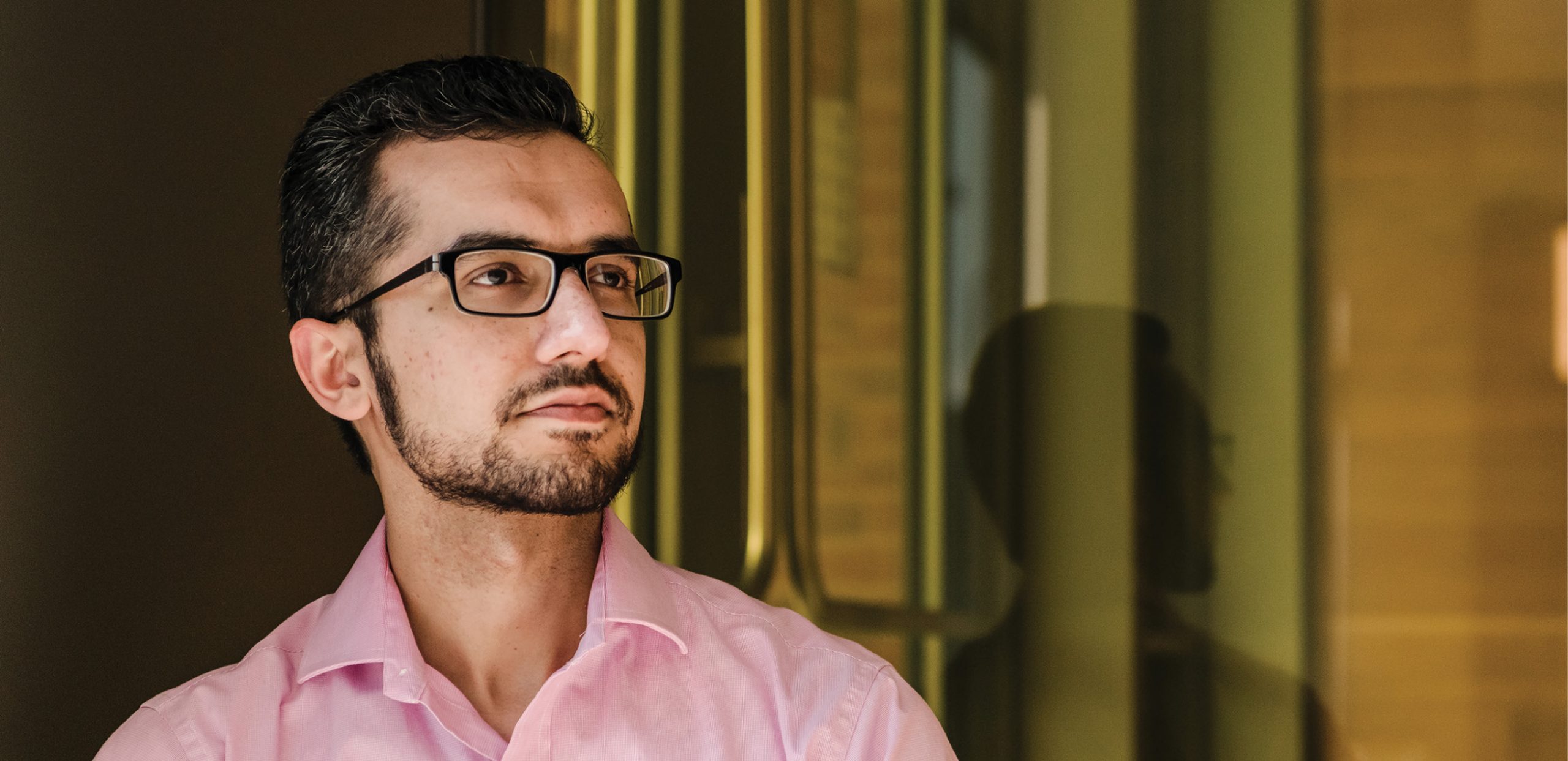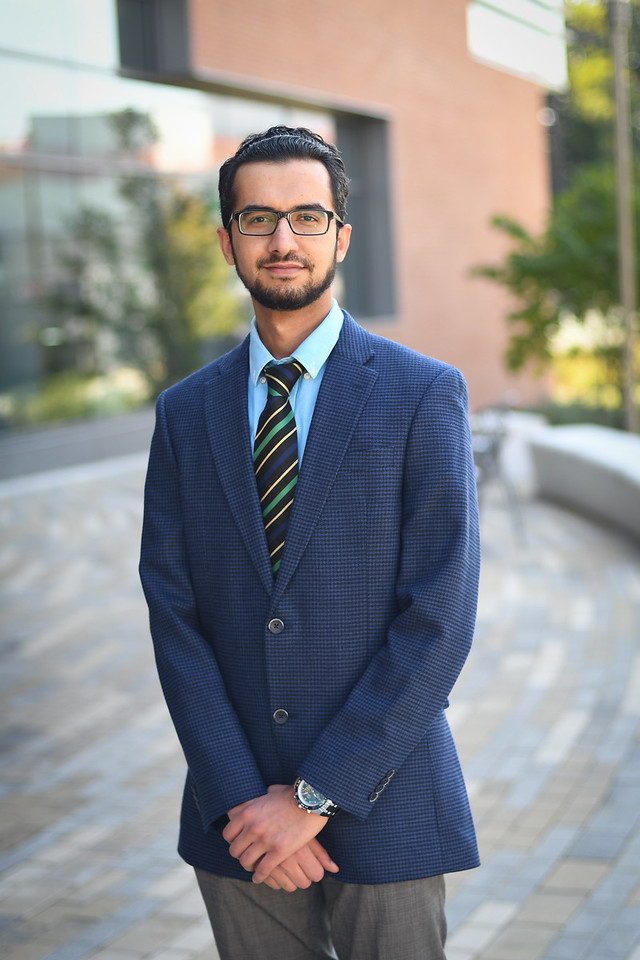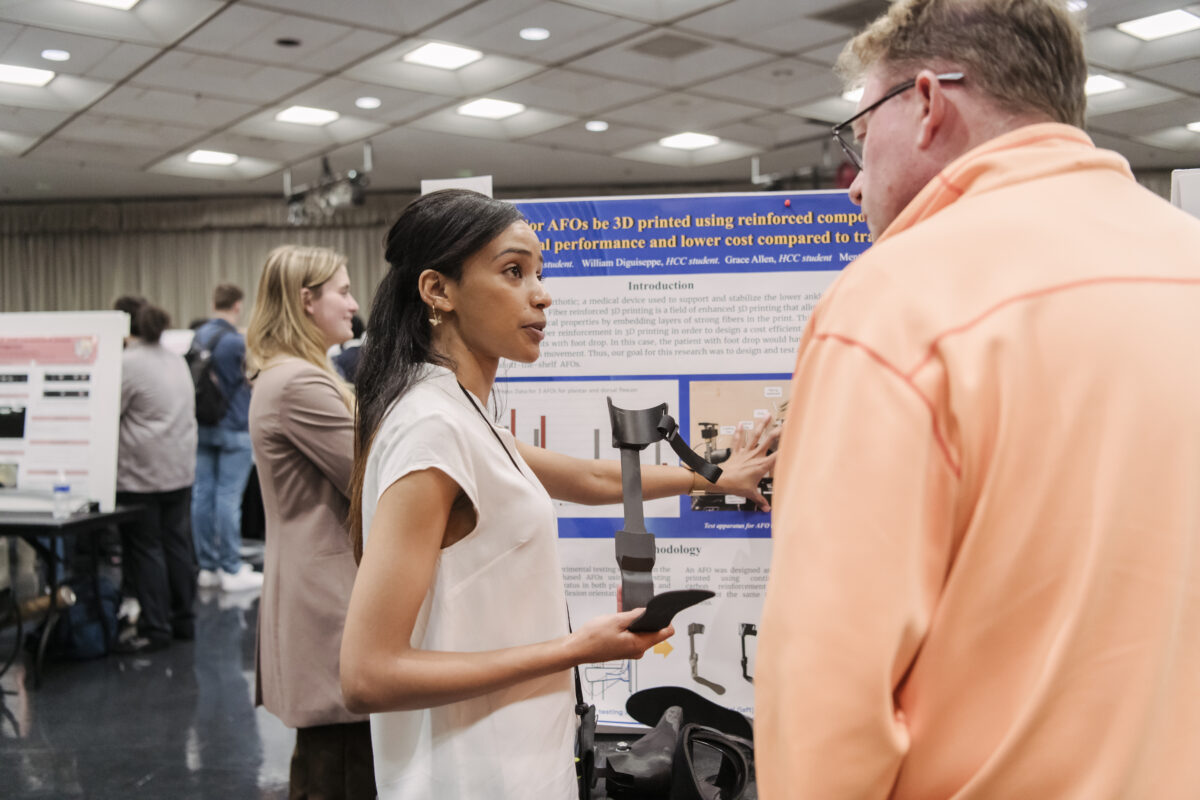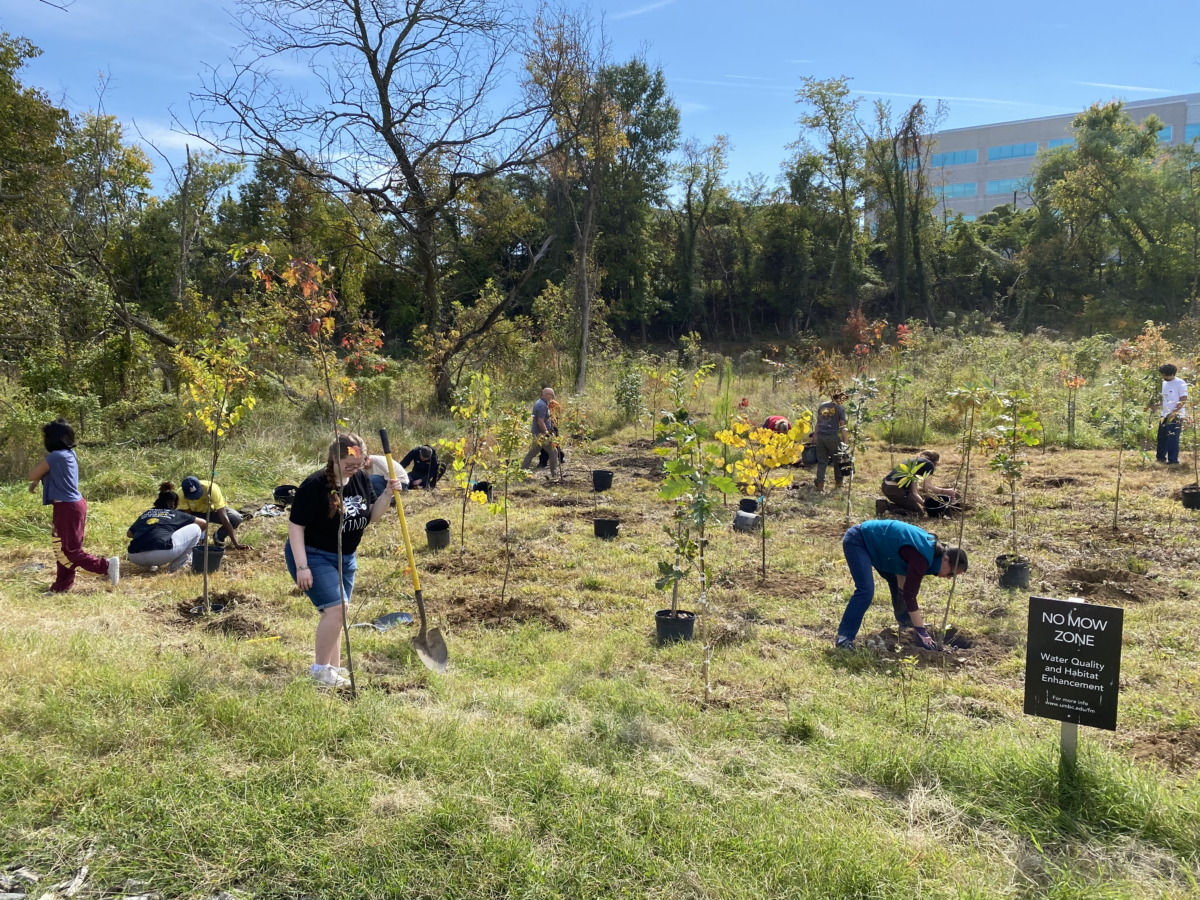Arrested for his role in a failed terrorist plot as a teenager, Mohammed Khalid found freedom from his radicalization after prison officials showed him kindness and empathy. Freed in 2017 and now a senior at UMBC, Khalid has surrounded himself with mentors as he researches how to help others see through the lure of extremism.
As an incoming transfer student to UMBC, Mohammed Khalid needed to be excused from some of the mandatory McNair Scholars Program orientation sessions to give a presentation at TEDxJHU. The title of his talk? Reconciling Humanity: Struggles of a Former Teenage Terrorist.
As McNair program director Michael Hunt listened to the information systems major tell his story over the phone, he could hear Khalid gaining more confidence as he went through the details. At the end, Hunt asked if Khalid would like to practice giving his presentation to his fellow McNair scholars before the real thing.
This is not how Khalid normally introduces himself at first meetings, but he doesn’t shy away from it either. “What I told him,” says Hunt, ’06, M13, mathematics, “is that you’re part of us now. You’re one of us. So just know that your story is now our story. Right? I really wanted him to understand that.”
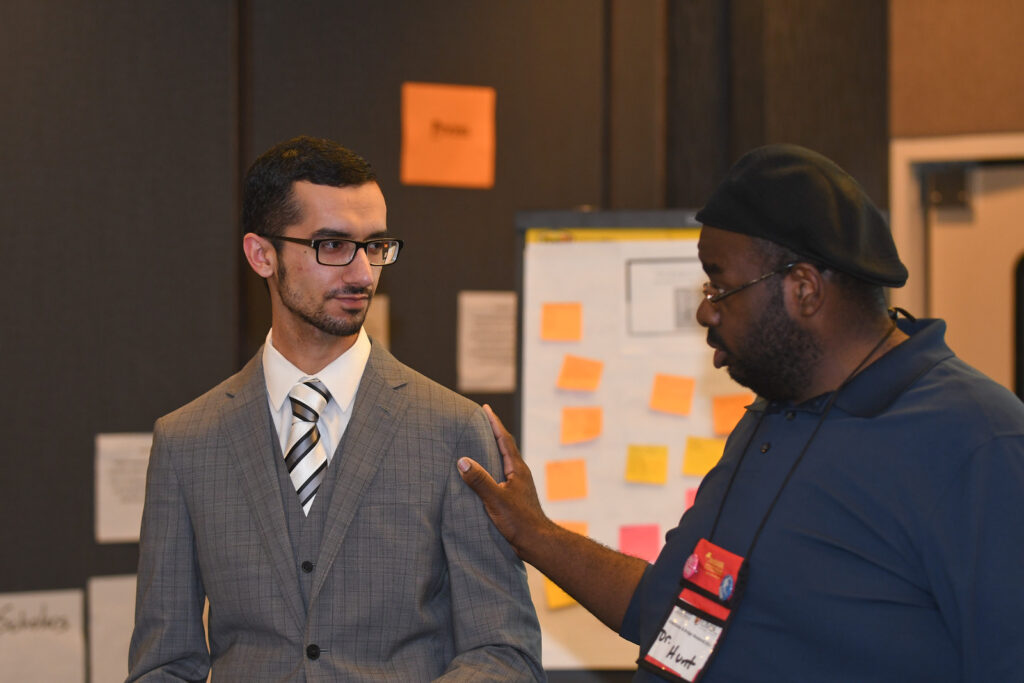
Before Khalid immigrated to America at age 13, his perspective of the West was shaped through literary fantasy like the Harry Potter books and The Chronicles of Narnia. Once arrived in a land less magical than he hoped, Khalid would come to be enmeshed in his own struggle of good versus evil, envisioning the world in a false dichotomy of strict black and white, pitting his perceived brothers and sisters versus the world.
Born in the United Arab Emirates and raised in Pakistan, Khalid and his family joined his father in 2007 in Howard County, Maryland. Certain memories stand out from that first day, he says. An overly brusque immigration officer at the airport in New York, his father in the car emphasizing that this is their new home—they will go to school, work, live, and die here one day, he said—and the loneliness of arriving at their townhouse late at night.
One thing that excited Khalid was starting school in his new country. He already knew English well after being brought up in a British education system and was excited to find a group of friends. But when he introduced himself in class, his new classmates snickered, he remembers.
“Mohammed is a terrorist’s name,” they told him.
Sharing his journey
Khalid ’21, information systems—a Cyber Scholar, an Honors College student, and a UMBC McNair Scholar—has shared these painful memories very publicly—in a Vice news segment, in panels around the country, and recently in a national magazine. He presents them not as an excuse for what followed in his teenage years, but as an open way of grappling with the decisions he made, with the goal that he might possibly help someone else avoid the descent into extremist circles.
Mohammed Khalid was the youngest person to be convicted of terrorism in the United States. He was arrested at 17 in July 2011 and released from criminal custody in December 2015, although he was immediately detained by the U.S. Immigration and Customs Enforcement until May 2017. He won his U.S. citizenship in 2018. After his deradicalization in prison, Khalid has dedicated his life to helping other young people not fall under the sway of extremists like he did.
Hunt explains that the McNair program does more than prepare students for graduate education in all disciplines through research, mentoring, and other scholarly activities—it also focuses heavily on community building with an emphasis on providing a space where students can cultivate productive interactions, and speak honestly and critically from their own experience with the goal of mutual learning.
Khalid took Hunt up on the offer to practice his talk in front of the McNair peers he had only just met. “There was a real emotional connection,” remembers Hunt, “and an understanding of his vulnerability. I know that for the community, it really shaped their understanding of the dynamics of the group. So it wasn’t just about him. It was about how this allows you to connect with a group of people who are going to be sharing your journey.”
Who are your brothers and sisters?
Connecting with people in real life was not going well for Khalid in high school. The terrorist comments didn’t abate, and neither did digs at his religion and origins. These insults were completely out of context for Khalid, so he turned to a common source for answers—Google. He then found a home on YouTube where he met people he considered friends—his true brothers and sisters in the faith, he thought at the time—watching and translating into English videos explaining his religion. Soon, the website algorithm changed the videos promoted to Khalid; he was watching suicide bombings and communicating with people tied to Al-Qaeda and other terrorist organizations. He was embraced by people online who called him a brother and welcomed him into their extremist community.
“Calling someone your brother and sister in Islam is the biggest modicum of respect that you can give them,” explains Khalid. “I think that it’s an innate human need to be heard and to be listened to. And these people online who I was calling my brothers and sisters, I would talk to them online and then come to find out they were actually listening to me and they would reflect my feedback. That’s something, I think, very necessary to camaraderie.”
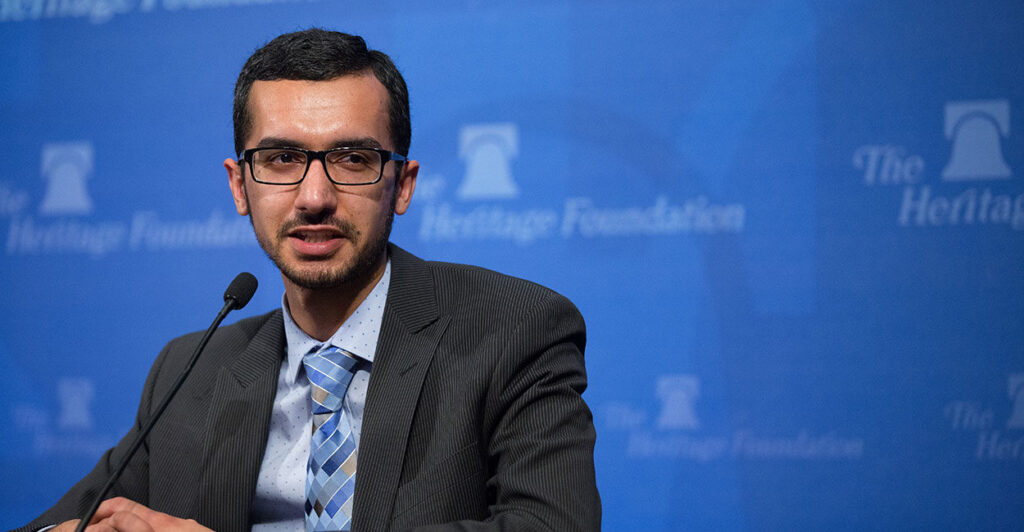
On his way to discovering more about his religion, Khalid mistook extremism for fervor, recognizing now that “extremists had actually hijacked the philosophy and the ideology of Islam, which I call Islamism; the political side of it obviously, not the religious side, which is different.”
In parsing how his thinking worked at the time, Khalid says he thought along these lines: “Well, my classmates are calling me a terrorist because of what’s happening in other countries and at the same time they [Americans] are hurting ‘my people.’ So who does my allegiance lie with? Is it with people who are part of my faith or with people whom I’ve just encountered in this new country who are actually demonstrating this antagonism against me?”
Khalid says he was spending 40 hours a week on YouTube chats with like-minded individuals, all the while pulling away from his real family. His involvement eventually broadened beyond the virtual, and in 2011, he was arrested in connection with an international (unsuccessful) plot to murder a Swedish cartoonist. He attempted to recruit people and solicit funds for an American woman known as “Jihad Jane” who was organizing the hit.
In his TEDx talk, Khalid goes into detail about his arrest and how surreal the situation seemed in the moment. An FBI officer had to remind the then-17-year-old to say goodbye to his parents. After his arrest, Khalid was diagnosed with Asperger’s Syndrome, a type of autism, which has helped explain to him those feelings of detachment during the harrowing moments of his arrest and also when thinking back on how hard it was to make friends in school.
“What I told him is that you’re part of us now. You’re one of us. So just know that your story is now our story. Right? I really wanted him to understand that.”
Michael Hunt, UMBC McNair program director
It was in prison, of all places, that Khalid says he began to see the shared humanity with fellow prisoners and guards alike. “All that the prisoners and prison officials wanted to do was understand, and all I ever wanted in my life was to be understood,” says Khalid. The correctional officers took time to share their own experiences with Khalid, which over time broke down the barriers Khalid had erected. One officer in a juvenile facility even challenged him, “Have you actually read the Qur’an from front to back?” When Khalid said no, he was given a copy.
“And I read it at that point,” Khalid says. “That’s when the ideological farce that I was believing in came breaking down. I think one of the verses that really resonated with me was how saving one life means that you’re saving humanity, and how killing one life, it’s like you’re killing all of humanity. I think that’s just one of the many beautiful principles in the Qur’an, that it is completely divorced from extremism.”
Finding ethical ways of detecting online radicalization
At UMBC, Khalid has jumped head first into his information systems major with a focus on cybersecurity. His drive to help other young people not fall sway to extremism online is apparent, says Vandana Janeja, professor and chair of Information Systems. “Mohammed has tapped into all the right resources for him to advance,” says Janeja. “He’s a real good example for other students—he showcases the best of what we have to offer at UMBC.”
Khalid transferred to UMBC in winter 2019. He quickly reached out to Janeja and Anupam Joshi, professor and chair of Computer Science and Electrical Engineering and the director of the UMBC Center for Cybersecurity, for help with formulating methodology for his research project assessing indicators of online radicalization.
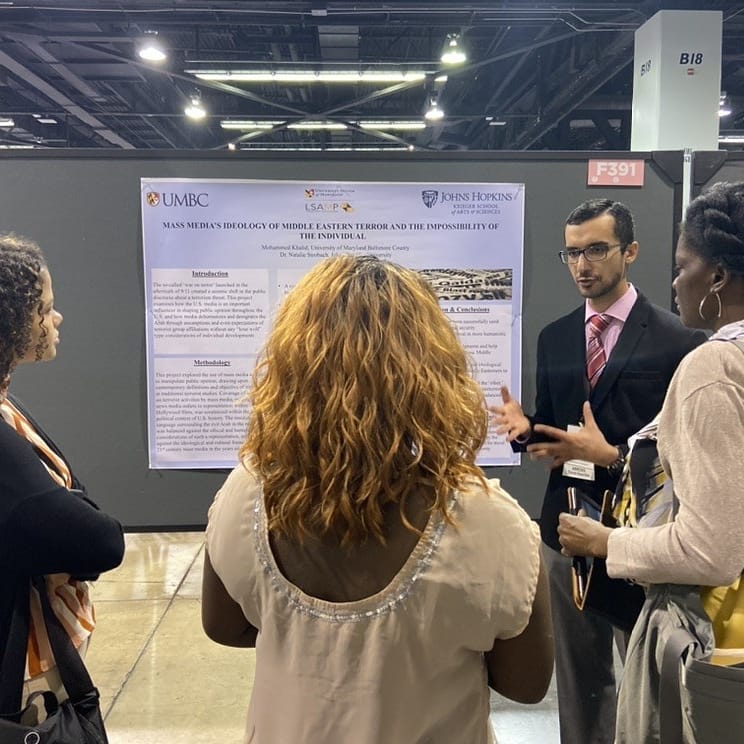
“Frankly, if I’m being very honest,” says Joshi, “if someone from any background other than Mohammed’s had approached me and said, ‘I want to do this work,’ I would have probably not agreed to do it. In some areas, you can’t bring a certain amount of necessary empathy to your research unless you’ve been in that situation.”
And what Khalid was interested in researching—how to detect signs of Islamist radicalization from online discourse—is extremely complex, adds Joshi. “It sounds deceptively simple, but it’s very hard to do that. Because you’re trying to judge the mental state of a person based purely on what they’re saying in public-facing platforms.”
Both Joshi and Janeja pushed Khalid to study the ethics of data analysis. “In speaking to him about his research, I encouraged him to look at various perspectives to data analytics,” shares Janeja. “In our department, we frequently have conversations around ethics with students. ‘Keep in mind, as you are making choices in your algorithm, that you’re using this threshold to cut off these participants from analysis or using this threshold which impacts people in a certain way.’” Joshi adds that researchers’ biases can also easily enter their algorithms without careful consideration.
“What I told Mohammed,” says Joshi, “was that for his project, I am happy if he just ends up getting exposed to these ideas and how the technology can be applied to detect radicalization. He’ll have the rest of his graduate career or research career if he wants to continue to improve things, because this is a particularly hard problem.”
Holistic mentorship
Khalid is in the distinct position of knowing personally how people can influence you to pursue good or evil. He has become more discerning about the type of mentors he allows into his life, but more than ever understands the need for trust and vulnerability and has surrounded himself with teachers who can address all facets of his mental, physical, spiritual, financial, and academic life.
When Khalid was released from prison in 2017 after his five-year sentence, he quickly sought to make up for lost time. Prior to being arrested, he had received early acceptance to Johns Hopkins University, but now he had to start his educational journey from scratch. “Rejection is the word I associate the most with that period,” Khalid says candidly. He eventually found his footing at the Community College of Baltimore County (CCBC).
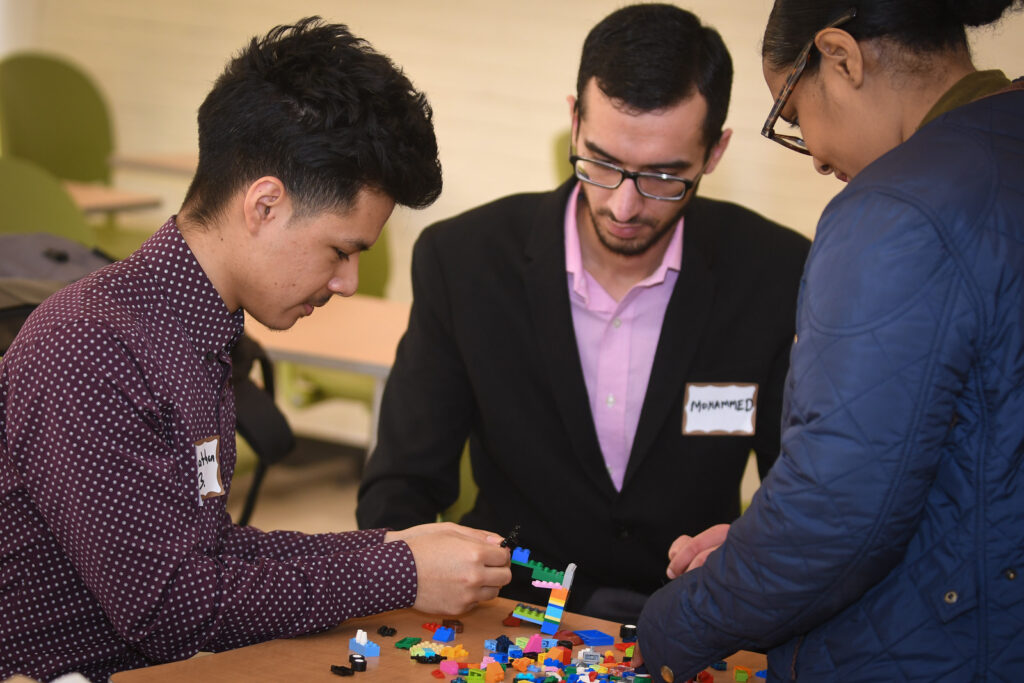
“Mohammed is the type of student that takes every opportunity that comes before him—every opportunity to grow, to learn, and to serve,” says Natasha Cole-Leonard, associate professor of English and director of the honors program at CCBC, who got to know Khalid when he was a leader in the honors program and on the student honors council.
At some time early in their relationship, Cole-Leonard says Khalid asked for a one-on-one meeting. “In reflection, I appreciated the fact that he trusted me to hear his story before it was a situation where he felt compelled to or because it was breaking news. It was just out of his own desire to be honest about his background.”
Khalid has continued to open up to advisors and mentors at UMBC, and through the McNair program has been mentoring other students as well. It’s a role he’s taken to heart. “One of the things that I really emphasize is empathy. We can all sympathize with anyone, but empathizing is where it becomes difficult because you’re really putting yourself in the other person’s shoes and looking through their eyes, which is super hard,” says Khalid. “It’s exciting and interesting to coach others, providing them with words of affirmation and giving them encouragement and support. I’m letting them know that I’m there for them, no matter what happens.”
McNair program director Hunt is developing his dissertation for the language, literacy, and culture Ph.D. program at UMBC on holistic critical mentoring, which he also practices with his McNair scholars. Some of the tenets Hunt mentions are reciprocity between mentee and mentor, while both parties are asked to collectively bring their culture and lived experiences to the relationship.
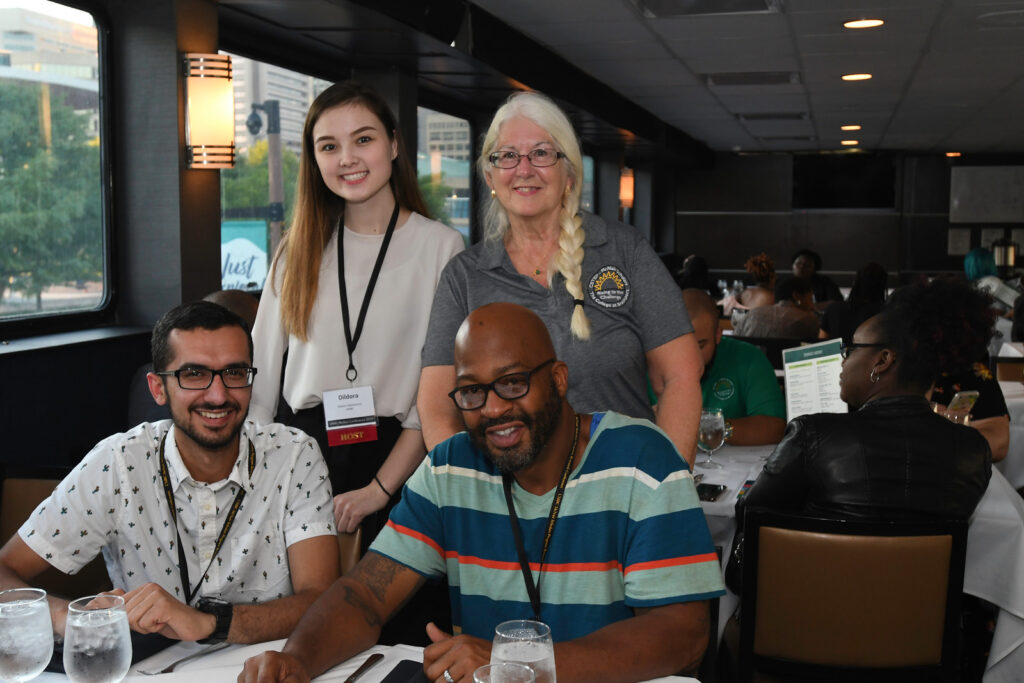
“We provide a space where affirmation comes first,” says Hunt. “Before any of the work, before we get to the deadlines, before we get to anything we’re dealing first with their humanity. In our McNair community, we have been intentional about scholars, staff, and mentors being able to show up as fully themselves.”
“Having someone who always believes in you is super important. And that’s something I’ve actually personally experienced at UMBC,” says Khalid. “All these people who I count as my mentors, Dr. Joshi, Dr. Janeja, Cindy Greenwood of the Cyber Scholars program, and Mr. Hunt…all these people actually believed in me when the whole world said I couldn’t do this, and here we are and I’m still a mentee.”
The power of being heard
Khalid’s cautionary tale against the temptations of extremism seems especially necessary in American culture currently. As the country wrestles with conspiracy theories that have torn at the fabric of the nation, what can we learn from the mistakes of teenager Khalid? “People tend to find ideology that already fits in with their perfect narrative…whatever reinforces what they want to believe in, no matter the regard for the facts out there,” says Khalid.
As hard as it might be, Khalid says, we need to work on pinpointing our commonalities.
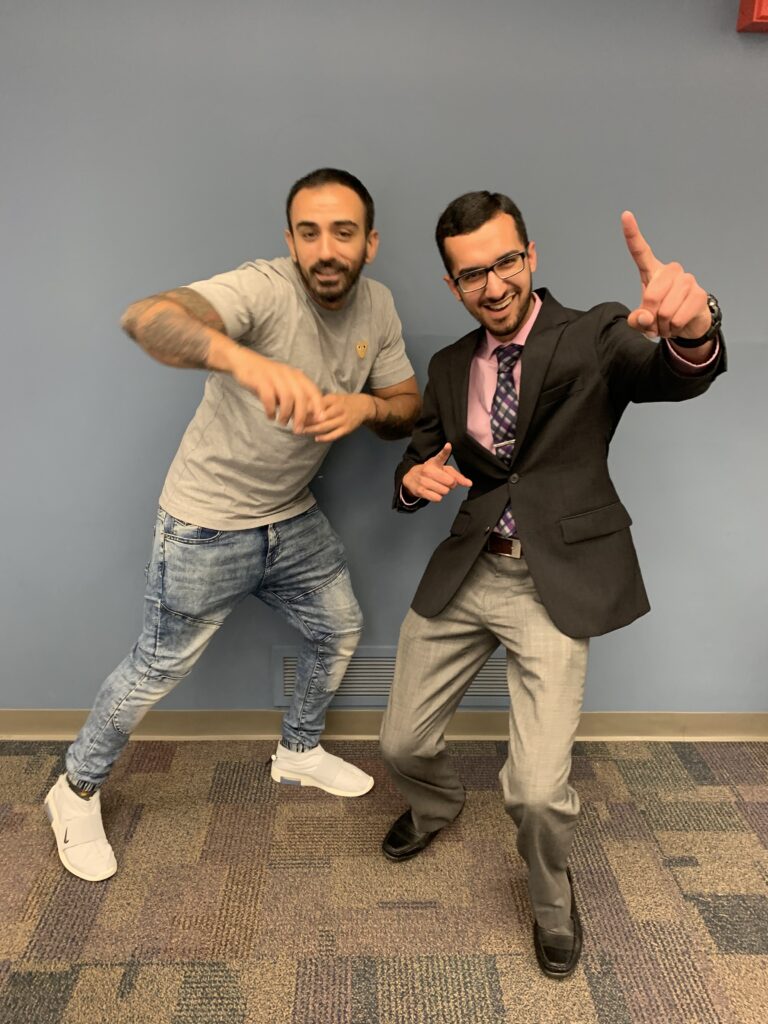
“Emphasize the humanity of the other person and things will get better. I know that sounds like just a perfect world, but I’ve found that people who feel heard—if you listen to their story—that’s a way to start the conversation of what’s bothering them.” He returns to his own period of deradicalization.
“I started to change after I was able to look at these correctional officers in a new light. This led me to come out of that us-versus-them mindset and believe, ‘Well, these people, their humanity is no different than mine,’” he says. “And that was the first crack in the ice, that kind of led to the shattering of the philosophy and the ideology that I was believing in.”
Khalid acknowledges that everyone loves “a classical prison story of redemption,” but knows that he will continue to face questions about the sincerity of his deradicalization. “To that,” he adds, “only time will tell, and time has been telling so far.”
*****
STEM professionals need to prioritize the social impact of their work. Read more about interdisciplinary teams at UMBC researching methods to support these efforts.
Header image: Mohammed Khalid ’21 on campus in spring 2021, by Marlayna Demond ’11. All other images provided by Khalid.
Tags: COEIT, Cybersecurity, Information Systems, McNair

